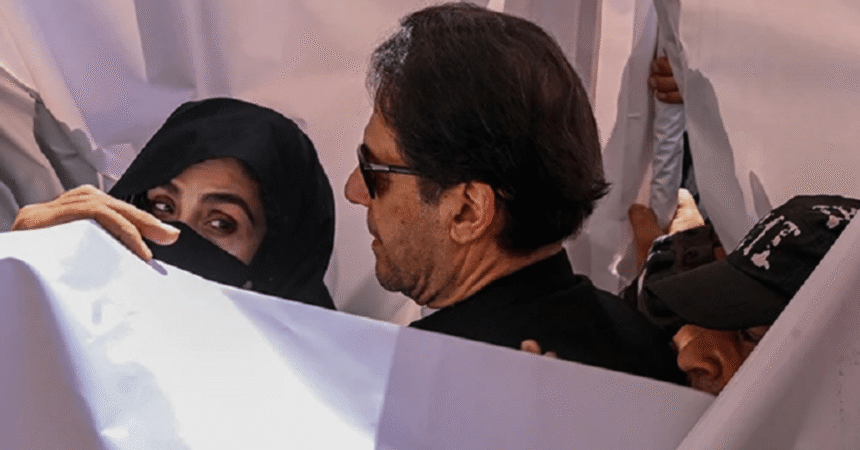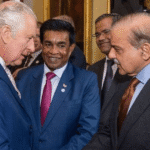Introduction
In a significant legal development, the Islamabad High Court (IHC) has intervened in the £190 million corruption case involving former Prime Minister Imran Khan and his wife, Bushra Bibi. This case has garnered extensive media attention, highlighting the complex relationship between law and politics in Pakistan. The IHC’s recent orders have temporarily halted the trial court’s ability to deliver a final verdict, allowing for further examination of the case at a higher judicial level. As this legal battle unfolds, it is essential to explore the implications of the IHC’s decision, the background of the case, and the broader political context surrounding the allegations against Khan and his wife.
Background of the Case
Allegations Against Imran Khan and Bushra Bibi
The £190 million case alleges that Imran Khan and Bushra Bibi engaged in corrupt practices during Khan’s tenure as Prime Minister. Specifically, the National Accountability Bureau (NAB), which is Pakistan’s primary anti-corruption agency, accuses them of misusing their authority and acquiring assets disproportionate to their known sources of income. The allegations include claims of financial irregularities and unaccounted wealth, which have become a focal point of political discourse in Pakistan.
The Role of the National Accountability Bureau
The NAB has been a significant player in the political landscape of Pakistan, often accused of being used as a political tool against opponents. Its investigation into Khan and Bushra Bibi’s financial dealings has raised questions about the objectivity and motivations behind the case. Critics argue that the NAB has been involved in politically motivated prosecutions, aimed at undermining the PTI and Khan’s influence in Pakistani politics.
Initial Proceedings in the Trial Court
The trial court had been moving forward with proceedings, examining evidence and hearing testimonies from both the prosecution and defense. As the case progressed, various legal motions were filed, including acquittal petitions from Khan and Bushra Bibi, seeking to challenge the legitimacy of the charges against them. The defense argued that the case lacked substantial evidence and was based on politically motivated accusations rather than concrete legal grounds.
The IHC’s Intervention
Orders Issued by the Islamabad High Court
On September 26, the IHC, presided over by Chief Justice Aamir Farooq and Justice Mian Gul Hasan Aurangzeb, issued a pivotal order restraining the trial court from delivering a final verdict. The court emphasized that since the acquittal petitions were already pending before the IHC, the trial court should refrain from concluding its proceedings until the higher court had an opportunity to review the legal arguments presented.
Notices Issued to the NAB
As part of its ruling, the IHC has also issued notices to the NAB, instructing them to appear for the upcoming hearing. This step indicates the court’s intention to closely scrutinize the prosecution’s case and ensure that due process is followed. By engaging the NAB in the proceedings, the IHC is underscoring the importance of accountability and fairness in the judicial process.
Legal Implications of the IHC’s Decision
Importance of the Acquittal Petitions
The acquittal petitions filed by Imran Khan and Bushra Bibi are critical for their legal strategy. If the IHC rules in favor of their acquittal, it could lead to the dismissal of the charges against them, significantly altering the political landscape in Pakistan. Conversely, if the IHC allows the trial court to proceed with its verdict, it could pose serious challenges for Khan’s political future and the PTI’s standing.
The Judicial Process
The IHC’s intervention highlights the multi-tiered nature of the judicial process in Pakistan. Legal battles often involve navigating through various courts, each with its own jurisdiction and authority. The IHC’s decision to halt the trial court’s proceedings demonstrates the checks and balances inherent in the Pakistani judicial system, allowing higher courts to review lower court decisions and ensuring that justice is served.
Precedent for Future Cases
The IHC’s ruling may set a precedent for future cases involving high-profile political figures. The decision underscores the importance of upholding legal standards and ensuring that all individuals, regardless of their political status, are afforded due process. This ruling may encourage other political figures facing similar allegations to seek judicial relief and challenge the legitimacy of charges brought against them.
Political Context and Implications
The Current Political Climate
The legal challenges faced by Imran Khan and Bushra Bibi occur against the backdrop of a turbulent political climate in Pakistan. Since Khan’s ousting from power in April 2022, the political landscape has been characterized by polarization and instability. The allegations of corruption have been weaponized by political opponents seeking to diminish Khan’s influence and undermine the PTI’s position in the political arena.
Allegations of Political Victimization
Khan and his supporters have consistently framed the legal proceedings as a politically motivated attack. They argue that the NAB’s actions are part of a broader strategy to discredit Khan and suppress dissent. This narrative resonates with many of Khan’s supporters, who view the corruption charges as a means to destabilize his political base and prevent him from regaining power.
The Role of the Judiciary
The judiciary plays a critical role in determining the trajectory of political controversies in Pakistan. The IHC’s decision to intervene in the case reflects the judiciary’s potential to influence political dynamics. By asserting its authority, the IHC may reinforce the notion that legal mechanisms can provide a counterbalance to political maneuvers aimed at undermining opponents.
Next Steps in the Legal Process
Upcoming Hearing Scheduled for September 26
The upcoming hearing on September 26 will be crucial in determining the future of the case. The IHC will review the acquittal petitions and the documentation submitted by Khan and Bushra Bibi’s legal team. The outcome of this hearing could significantly impact the legal and political landscape, either bolstering Khan’s standing or complicating his legal troubles further.
The Role of Legal Counsel
The legal teams representing Khan and Bushra Bibi are faced with the critical task of presenting compelling arguments that challenge the allegations made by the NAB. They must demonstrate the lack of substantial evidence and potentially highlight procedural irregularities in the trial court’s handling of the case. The effectiveness of their legal strategy will be pivotal in shaping the court’s decision.
Broader Implications for Pakistan
Impact on Anti-Corruption Efforts
The case against Khan and Bushra Bibi has broader implications for anti-corruption efforts in Pakistan. The manner in which this case is handled by the judiciary may influence public perceptions of the NAB and its role in combating corruption. If the NAB is perceived as politically biased or ineffective, it could undermine public confidence in its ability to address corruption comprehensively.
Public Trust in Government Institutions
Public trust in government institutions is critical for effective governance. The ongoing legal battles involving high-profile figures like Khan can erode this trust if not handled transparently. The judiciary’s ability to navigate these politically charged cases will be crucial in restoring public faith in the legal system and government institutions.
Future of Imran Khan and the PTI
The outcome of this case will significantly influence the future of Imran Khan and the PTI. A ruling in favor of acquittal could rejuvenate Khan’s political career and strengthen the PTI’s position, allowing it to regroup and challenge its opponents more effectively. Conversely, a conviction could have lasting repercussions for Khan’s political ambitions and the party’s viability.
Conclusion
The Islamabad High Court’s decision to halt the trial court’s final verdict in the £190 million case against Imran Khan and Bushra Bibi underscores the intricate interplay between law and politics in Pakistan. As the legal proceedings continue, the implications for both the couple and the broader political landscape will be closely observed. The upcoming hearing on September 26 is poised to be a pivotal moment, potentially influencing the trajectory of not only this case but also the future of Imran Khan and the PTI.
The IHC’s intervention illustrates the importance of due process and the role of the judiciary in ensuring accountability. The political ramifications of this case are profound, as it could either reinforce Khan’s political capital or contribute to his political downfall. As this legal saga unfolds, it serves as a reminder of the complexities of governance and the enduring struggle for integrity in Pakistan’s political system.
#ImranKhan #BushraBibi #IHC #PakistanPolitics #CorruptionCase #NAB #AcquittalPetition #LegalBattle #PTI #IslamabadHighCourt







